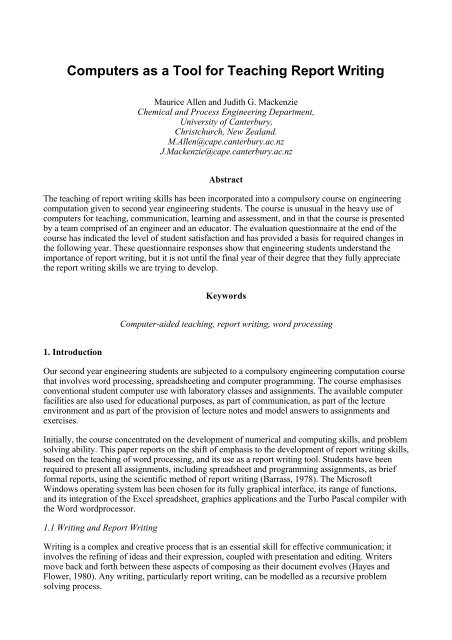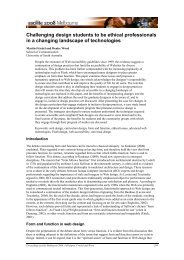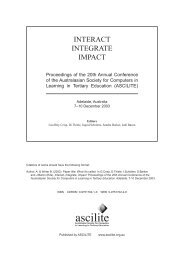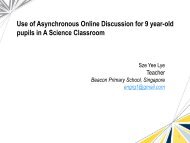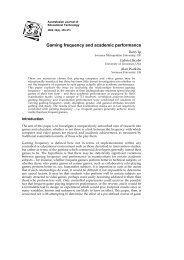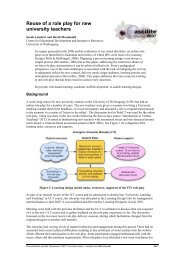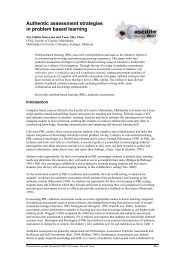Computers as a Tool for Teaching Report Writing - ascilite
Computers as a Tool for Teaching Report Writing - ascilite
Computers as a Tool for Teaching Report Writing - ascilite
Create successful ePaper yourself
Turn your PDF publications into a flip-book with our unique Google optimized e-Paper software.
<strong>Computers</strong> <strong>as</strong> a <strong>Tool</strong> <strong>for</strong> <strong>Teaching</strong> <strong>Report</strong> <strong>Writing</strong><br />
Maurice Allen and Judith G. Mackenzie<br />
Chemical and Process Engineering Department,<br />
University of Canterbury,<br />
Christchurch, New Zealand.<br />
M.Allen@cape.canterbury.ac.nz<br />
J.Mackenzie@cape.canterbury.ac.nz<br />
Abstract<br />
The teaching of report writing skills h<strong>as</strong> been incorporated into a compulsory course on engineering<br />
computation given to second year engineering students. The course is unusual in the heavy use of<br />
computers <strong>for</strong> teaching, communication, learning and <strong>as</strong>sessment, and in that the course is presented<br />
by a team comprised of an engineer and an educator. The evaluation questionnaire at the end of the<br />
course h<strong>as</strong> indicated the level of student satisfaction and h<strong>as</strong> provided a b<strong>as</strong>is <strong>for</strong> required changes in<br />
the following year. These questionnaire responses show that engineering students understand the<br />
importance of report writing, but it is not until the final year of their degree that they fully appreciate<br />
the report writing skills we are trying to develop.<br />
1. Introduction<br />
Keywords<br />
Computer-aided teaching, report writing, word processing<br />
Our second year engineering students are subjected to a compulsory engineering computation course<br />
that involves word processing, spreadsheeting and computer programming. The course emph<strong>as</strong>ises<br />
conventional student computer use with laboratory cl<strong>as</strong>ses and <strong>as</strong>signments. The available computer<br />
facilities are also used <strong>for</strong> educational purposes, <strong>as</strong> part of communication, <strong>as</strong> part of the lecture<br />
environment and <strong>as</strong> part of the provision of lecture notes and model answers to <strong>as</strong>signments and<br />
exercises.<br />
Initially, the course concentrated on the development of numerical and computing skills, and problem<br />
solving ability. This paper reports on the shift of emph<strong>as</strong>is to the development of report writing skills,<br />
b<strong>as</strong>ed on the teaching of word processing, and its use <strong>as</strong> a report writing tool. Students have been<br />
required to present all <strong>as</strong>signments, including spreadsheet and programming <strong>as</strong>signments, <strong>as</strong> brief<br />
<strong>for</strong>mal reports, using the scientific method of report writing (Barr<strong>as</strong>s, 1978). The Microsoft<br />
Windows operating system h<strong>as</strong> been chosen <strong>for</strong> its fully graphical interface, its range of functions,<br />
and its integration of the Excel spreadsheet, graphics applications and the Turbo P<strong>as</strong>cal compiler with<br />
the Word wordprocessor.<br />
1.1 <strong>Writing</strong> and <strong>Report</strong> <strong>Writing</strong><br />
<strong>Writing</strong> is a complex and creative process that is an essential skill <strong>for</strong> effective communication; it<br />
involves the refining of ide<strong>as</strong> and their expression, coupled with presentation and editing. Writers<br />
move back and <strong>for</strong>th between these <strong>as</strong>pects of composing <strong>as</strong> their document evolves (Hayes and<br />
Flower, 1980). Any writing, particularly report writing, can be modelled <strong>as</strong> a recursive problem<br />
solving process.
Engineering students rejoice in a self image of being achievers and facilitators rather than reporters or<br />
articulate wordsmiths. This self image is particularly inappropriate with the incre<strong>as</strong>ing emph<strong>as</strong>is on<br />
communication in professional engineering, both in personal presentation and in the extensive<br />
preparation of individual and group reports.<br />
1.2. Process <strong>Writing</strong>.<br />
Various models have been proposed to understand the processes writers adopt. Such models are<br />
usually b<strong>as</strong>ed on a number of <strong>as</strong>sumptions: writing involves active and complex problem solving;<br />
writing consists of several processes - thinking, planning, generating ide<strong>as</strong>, evaluation and revision,<br />
which are invoked in a recursive manner; differences between novice and expert writers can appear<br />
both at the level of the problem addressed and in the interaction of the processes; and l<strong>as</strong>tly, that <strong>for</strong><br />
effective communication, the strategy of problem solving adopted by the writer is intimately related to<br />
the nature and purpose of the writing t<strong>as</strong>k (Hildyard, 1994).<br />
Motivation plays a strong role in cognitive per<strong>for</strong>mance, but it is not clear what that role might be in<br />
relation to writing. Selecting a topic <strong>for</strong> oneself will facilitate the process, presumably <strong>as</strong> a result of<br />
incre<strong>as</strong>ed involvement and interest (Englert, Stewart and Hiebert, 1988). Motivation in report writing<br />
is coupled directly to the enthusi<strong>as</strong>m <strong>for</strong> the t<strong>as</strong>k and topic, and engineering students must develop the<br />
required discipline, <strong>as</strong>sisted by a well-defined writing process.<br />
Even <strong>for</strong> experts, written composition remains a complex and difficult t<strong>as</strong>k. Studies on expert writers<br />
indicate that evaluation and revision are critical components of the writing process, with experienced<br />
writers focusing upon global <strong>as</strong>pects of the text. Inexperienced writers, however, tend to focus on<br />
“local” problems, such <strong>as</strong> grammar, syntax, and word choice (Hildyard, 1994).<br />
Process writing incorporates the top-down view of the writing process, emph<strong>as</strong>ising iterative<br />
refinement, and the interplay between content and expression. The limitation in the implementation of<br />
this view of the writing process h<strong>as</strong> been the unavoidable dedication and manual ef<strong>for</strong>t of writing and<br />
rewriting. Wordprocessing removes this limitation with its facilities <strong>for</strong> <strong>as</strong>sessment and revision.<br />
1.3 Wordprocessing<br />
Does the teaching of wordprocessing facilitate the enhancement of writing skill? Cochrane-Smith<br />
(1991), when discussing the research literature on word processing, posed the crucial question Do<br />
students write better with wordprocessing? and answered It depends! The effects of word processing<br />
depend on many factors: the writer’s preferred writing and revising strategies, keyboard skills, prior<br />
computer experience, available computing facilities, additional instruction and the school or university<br />
environment. Users of word processors might compose longer documents and engage in more<br />
revisions of their documents than comparable users of pen and paper.<br />
Word processing facilitates revision of the written word. A common finding in research of this nature<br />
is a correlation between good writing and higher levels of revision. Hartley (1991) describes the level<br />
of revision <strong>as</strong> a major factor that distinguishes expert from novice writers.<br />
Cochrane-Smith (1991) reports that students make more revisions when writing with a<br />
wordprocessor. However, wordprocessing alone does not improve the quality of student writing.<br />
<strong>Writing</strong> is a creative process that involves generating ide<strong>as</strong>, planning, writing and revising. However,<br />
a number of studies have shown that the introduction of word processing into instructional<br />
programmes is able to affect positively the quality of writing output (Aumack, 1985; Fisher, 1983).<br />
Engineers particularly welcome the support of a spelling checker and a grammatical appraisal.<br />
One vital factor that limits the success of word processing <strong>as</strong> a writing tool is keyboard unfamiliarity.<br />
Dybdahl and Shaw (1989) found that lack of keyboard skills w<strong>as</strong> an impediment to writing with a<br />
word processor. Poor keyboard skills may incre<strong>as</strong>e the burden of report writing and divert from the
writing process, and the lack of these skills is closely related to an inexperience with computers and<br />
the computer culture. Our students enter the School of Engineering with a wide range of computer<br />
experience, and the unfamiliar are prone to computer phobia. An optional course in keyboard skills<br />
prior to the engineering computation course is essential.<br />
1.4. <strong>Computers</strong> and Learning<br />
Questions about the impact of computers on student learning and thinking have not always been<br />
clearly answered. According to Salomon (1992), one must distinguish between two different ways<br />
computers can affect human learning and intellect.<br />
One way concerns the changes in per<strong>for</strong>mance that people display when using computers - <strong>for</strong><br />
example the quality of the student’s accomplishment while using a computer-b<strong>as</strong>ed graphic tool <strong>for</strong><br />
solving mathematical problems, or the level of presentation in the writing process when using a word<br />
processor. Working with a computer affects what one does and how well one does it. Care must be<br />
taken, when teaching word processing, that students do not devote more time learning how to use a<br />
word processing program than to improving writing ability (Becker, 1991).<br />
The other computer effect, particularly <strong>as</strong> a tool <strong>for</strong> report writing, is the influence on the quality of<br />
student thinking and on their learning processes, such <strong>as</strong> cognitive learning, creative expression, and<br />
communication skills. Our experience h<strong>as</strong> been that the presentation and content of student reports<br />
significantly and consistently improves with each <strong>as</strong>signment throughout the engineering computation<br />
course.<br />
1.5. <strong>Report</strong> <strong>Writing</strong><br />
<strong>Report</strong> writing is introduced to the engineering computation course by a single lecture using a<br />
computer-b<strong>as</strong>ed data projector presentation. The conventions of grammar, spelling and punctuation<br />
are emph<strong>as</strong>ised, but the lecture specifically focuses on the Scientific Method of report writing<br />
(Barr<strong>as</strong>s, 1978). One lecture on report writing is inadequate <strong>for</strong> such an important topic; the vital<br />
issues of clarity, style and completeness are neglected. However, other cl<strong>as</strong>ses with a major<br />
laboratory component teach report writing separately, generally in agreement.<br />
2. Evaluation and Course Assessment<br />
The processes of action research; planning, acting, observing and reflecting (Kolb, 1984; Zuber-<br />
Skerritt, 1993); have been used <strong>as</strong> a framework to improve the practice of teaching and learning in<br />
this course in a systematic way. For each of the l<strong>as</strong>t four years a consistent student evaluation<br />
questionnaire, <strong>as</strong> part of the observation ph<strong>as</strong>e, h<strong>as</strong> been completed by most of the cl<strong>as</strong>s. Studentinitiated<br />
improvements to the course have included a more structured <strong>for</strong>mat <strong>for</strong> the laboratory<br />
cl<strong>as</strong>ses, improvement to the reliability and e<strong>as</strong>e of use of the computer system, the provision of online<br />
resources and the abolition of a <strong>for</strong>mal examination - <strong>as</strong>sessment is now completely by<br />
per<strong>for</strong>mance in <strong>as</strong>signments.<br />
The other clear student requirement w<strong>as</strong> <strong>for</strong> reference material. Word Idioms (Allen and Mackenzie,<br />
1995) is a booklet written to help the students understand MS Word, Version 6.0, and to facilitate<br />
learning wordprocessing skills. This document is organised <strong>as</strong> a mini reference, arranged <strong>as</strong> a series<br />
of answers to How to questions, and is designed to be used while students are working at a computer.<br />
2.1 Feedback and Rein<strong>for</strong>cement<br />
The most effective <strong>as</strong>sistance <strong>for</strong> students is an individualised, oral response from a teacher during the<br />
writing process (Freedman and McLeod, 1988). Engineering computation students may discuss their<br />
<strong>as</strong>signments or other difficulties with their lecturer or a tutor any time they can find them available, <strong>as</strong><br />
well <strong>as</strong> at specific open office hours. Tutors are available in the computer laboratory <strong>for</strong> about four<br />
hours per day throughout the week, and <strong>for</strong> more restricted hours on the weekend. Further tutor
support would be appreciated, both in laboratory cl<strong>as</strong>ses and full time in the Computer Laboratory.<br />
Limitation of resources constrain teaching effectiveness.<br />
Each <strong>as</strong>signments is marked by one person to provide uni<strong>for</strong>mity in the marking. Our students get<br />
feedback and rein<strong>for</strong>cement by detailed comments on their marked reports - a time consuming t<strong>as</strong>k in<br />
a large cl<strong>as</strong>s of 250 students. Explicit marking is also essential to convince students of the justice of<br />
their final grade - an outcome of incre<strong>as</strong>ed <strong>as</strong>signment weighting <strong>for</strong> <strong>as</strong>sessment (Sommers, 1980).<br />
2.2 Student Responses<br />
Questionnaire results show that students find computer-b<strong>as</strong>ed teaching effective. The ability to see the<br />
result of actions on a large screen <strong>as</strong> they are discussed enlivens the lecture process.<br />
100<br />
80<br />
60<br />
40<br />
20<br />
0<br />
Computer and Projector in Lectures<br />
Useful?<br />
Yes Indifferent No<br />
Response<br />
1992<br />
1993<br />
1994<br />
1995<br />
Figure 1. The effectiveness of Computer Displays in Lectures<br />
However, inadequacies in lecturer computing skills are very obvious, and any equipment malfunction<br />
may destroy a lecture. Fallback me<strong>as</strong>ures, such <strong>as</strong> a supplementary set of overhead transparencies, are<br />
prudent.<br />
How do the engineering students react to having to write a report <strong>for</strong> their <strong>as</strong>signments? Figure 2<br />
shows that most students understand the importance of good report writing.
70<br />
60<br />
50<br />
40<br />
30<br />
20<br />
10<br />
0<br />
Re<strong>as</strong>onable to Write an Engineering <strong>Report</strong><br />
Yes Doesn't<br />
matter<br />
Response<br />
Figure 2. <strong>Report</strong> <strong>Writing</strong> <strong>as</strong> part of the Engineering Process<br />
Some students still argue that only technical content is important - that report writing is separate, a<br />
distraction, a dilution of their creative ef<strong>for</strong>t taking time from more important technical considerations.<br />
However, our in<strong>for</strong>mal contact with final year students nearing the end of an engineering degree<br />
indicates that their appreciation <strong>for</strong> the need <strong>for</strong> good communication in engineering is better<br />
understood, and are grateful <strong>for</strong> help to improve the quality of their writing. Further, some understand<br />
that writing can be a useful tool to help with problem solving and understanding the mathematical<br />
content of engineering or other subject are<strong>as</strong>.<br />
No<br />
1992<br />
1993<br />
1994<br />
1995<br />
Most students enjoy working with computers. The wordprocessor makes the process of writing<br />
much less arduous than with pen and paper. Wordprocessing facilitates the process view of writing,<br />
enabling the composing text to go through a series of stages in planning, production, revision and<br />
editing.<br />
70<br />
60<br />
50<br />
40<br />
30<br />
20<br />
10<br />
0<br />
Enjoy Working With <strong>Computers</strong><br />
Yes Indifferent No<br />
Response<br />
1992<br />
1993<br />
1994<br />
1995<br />
Figure 3. Student Enjoyment of Working with a Computer.
3. Conclusion<br />
<strong>Writing</strong> is a complex process that is an essential skill <strong>for</strong> effective communication. Wordprocessing<br />
is compatible with a process view of writing <strong>as</strong> it allows the students to revise and rewrite their<br />
written work e<strong>as</strong>ily. <strong>Computers</strong> <strong>as</strong> a tool <strong>for</strong> report writing can influence the quality of student<br />
thinking and learning processes. Our endeavours to improve the content and presentation of<br />
engineering students’ reports have had impact over the l<strong>as</strong>t five years. Our next objective is to<br />
improve writing style.<br />
4. References<br />
Allen, R.M. and Mackenzie, J.G. (1995). Word idioms, Department of Chemical and Process<br />
Engineering, University of Canterbury, Christchurch.<br />
Aumack, J. (1985). <strong>Computers</strong> <strong>for</strong> non-writers. Principal, Vol. 65, pp. 46-48.<br />
Barr<strong>as</strong>s, R. (1978). Scientists must write. Chapman and Hall, New York:<br />
Becker, H. J. (1991). How computers are used in the United States schools: B<strong>as</strong>ic data from the 1989<br />
IEA <strong>Computers</strong> in Education survey. Journal of Educational Computing Research, Vol. 7, No. 4,<br />
pp. 385-406.<br />
Cochrane-Smith, M. (1991). Word processing and writing in elementary cl<strong>as</strong>srooms: A critical<br />
review of related literature. Review of Educational Research, Vol. 61, No. 1, pp. 107-55 .<br />
Dybdahl, C. and Shaw, D. (1989). Issues of interaction: Keyboard, word processing and composing.<br />
Journal of Research on Computing in Education. Vol. 21, No. 4.<br />
Englert, C.S., Stewart, S. R. and Hiebert, E.H. (1988). Young writers use of text structure in<br />
expository text generation. Journal of Educational Psychology, Vol. 80, No. 2, pp. 143 -51.<br />
Fisher, G. (1983). Word processing - will it make all kids love to write? Instructor. Vol. 92, pp. 87-<br />
88.<br />
Freedman S.W. and McLeod A. (1988). National surveys of successful teachers of writing and their<br />
students: The United Kingdom and the United States (Technical <strong>Report</strong> No. 14). Center <strong>for</strong> the Study<br />
of <strong>Writing</strong>, University of Cali<strong>for</strong>nia, Berkeley, Cali<strong>for</strong>nia.<br />
Hartley, J. (1991). Psychology: <strong>Writing</strong> and computers: A review of research. Visible Language,<br />
Vol. 4, No. 25, pp. 339-375.<br />
Hayes, J. R. and Flower L. S. (1980). Identifying the organisation of writing processes. In L. W.<br />
Greg and E. R. Steinberg (Eds.), Cognitive processes in writing. Erlbaum, Hillsdale, New Jersey.<br />
Hildyard, A (1994). <strong>Writing</strong>, learning and instruction of ... . In T. Husen and T. N. Postlethwaite<br />
(Eds.), The international encyclopaedia of education: Research and studies, Ox<strong>for</strong>d: Pergamon<br />
Press, Vol. 11, pp. 6778-6781.<br />
Kolb, D.A. (1984). Experiential learning, experiences <strong>as</strong> the source of learning and development.<br />
Prentice-Hall, Englewood Cliffs, N.J.<br />
Salomon, G. (1992). Effects with and of computers and the study of computer-b<strong>as</strong>ed learning<br />
environments. In E. De Corte, M. C. Linn., H. Mandl and L. Verschaffel (Eds.), Computer-b<strong>as</strong>ed<br />
learning environments and problem solving. Springer-Verlag, Berlin.
Sommers N. I. (1980). Revision strategies of student writers and experienced adult writers. College<br />
Composition and Communication, Vol. 31, No. 4, pp. 378-87.<br />
Zuber-Skerritt, O. (1993). Improving learning and teaching through action research. Higher<br />
Education Research and Development, Vol 12, No. 1, pp. 45-58.


